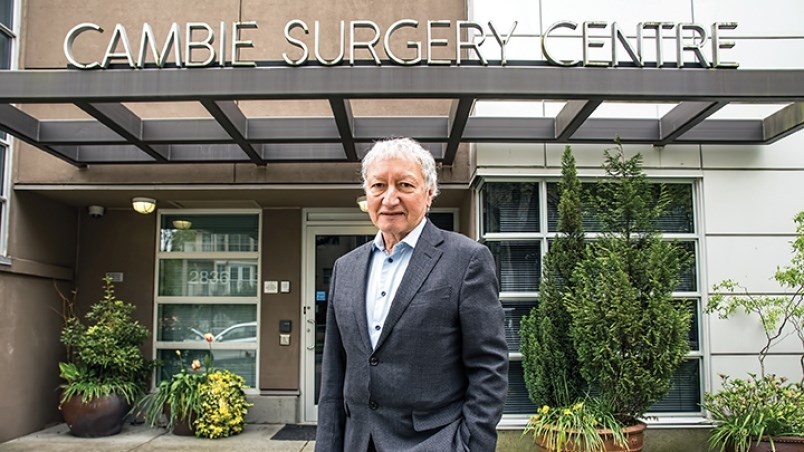Our hospitals are under enormous pressure from a tiny lethal virus, forcing our health-care system to navigate an unchartered pandemic by prioritizing care. But there are ways to release some of that pressure on hospitals during these most unusual times.
Unfortunately, the battle between private and public health-care is not helping hospitals in British Columbia following a ruling by the B.C. Supreme Court, which is increasing surgical wait times.
I have undergone two failed foot operations in the B.C. public system, only to be sent to the back of the line, enduring a two-year wait between operations. My medical odyssey is going on five years, and for obvious reasons, COVID-19 has aggravated my situation and that of many others.
My situation is not life-threatening, but it is life-limiting. The number of cancelled elective surgeries have impacted many people and for good reason. Our hospitals were already overcrowded before the pandemic, which is constantly threatening to overwhelm them.
Tough decisions are called for. Smart decisions are also called for. Never before has the need for private, for-profit healthcare been so critically and painfully called for.
Facing at least two more years of waiting and most likely more, I turned to the Cambie Surgery Centre in Vancouver, where I would have been on the operating table in a couple of months, not years, and it would have removed me from the public queue. Indeed, I am fortunate to be in a position to do so.
Imagine my frustration, after struggling with my decision, only to be told the Cambie clinic would not be able to perform my surgery, following a decision by the B.C. Supreme Court against the clinic and the subsequent threat of legal action by the province if it continued to provide private health care, while it waits to be heard by the B.C. Court of Appeal.
And here’s the absurdity: The B.C. NDP government is tightening the screws on private health care at a time when the pressures on our health-care system have never been so great.
On Sept. 10, the Supreme Court dismissed the Cambie Surgery Centre’s decade-long legal challenge that long wait times are unconstitutional, denying patients the right to timely care.
Dr. Brian Day, founder and medical director of the Cambie Surgery Clinic and past president of the Canadian Medical Association, argued that wait times for medical procedures violates the Charter of Rights and Freedoms (Section 7), including the right to life, liberty and security of the person.
Day is a strong advocate for a patient-centred system with a greater role for competition in the Canadian health-care system as a means to reduce wait times, in turn saving taxpayer’s money by treating people before their condition worsens.

But Justice John J. Steeves of the B.C. Supreme Court did not see it that way, although he did state: “Based on expert evidence, I find that for some patients … the wait is clinically significant to their health and well-being. I conclude that in these situations denying patients the ability to avoid unreasonable wait times violates their right to security of the person.”
But he went on to say, that limit was in step with the “principles of fundamental justice” because it was not arbitrary, overly broad or grossly disproportionate.
Good news to those who are fighting against private clinics, whose argument is that it favours the healthiest and wealthiest, by allowing treatment to those with higher incomes. They also claim that private, for-profit health care siphons doctors, nurses and resources away from our already overstretched public health system.
Sadly, the B.C. government’s threat of sanctions against the clinic effectively cancelled hundreds, if not thousands, of surgeries, forcing people back into the extra-strained public system due to COVID-19.
An appeal of the B.C. Supreme Court ruling to the B.C. Court of Appeal is scheduled for June 2021.
In the meantime, I find myself, once again, at the back of the line waiting for a third surgery in the public system, which could now be three years out before I even get to the operating table. Add in recovery time and I am facing more than three years. Meanwhile, the impact on my foot, ankle, knee, hip and gait is getting worse by the day.
According to Waiting Your Turn: Wait Times for Health Care in Canada, 2019 Report by the Fraser Institute, it is estimated that more than one million people were on a wait list in 2019, up by 124 per cent from 1993.
“Wait times can, and do, have serious consequences such as increased pain, suffering, and mental anguish,” stated the report.
“In certain instances, they can also result in poorer medical outcomes — transforming potentially reversible illnesses or injuries into chronic, irreversible conditions, or even permanent disabilities. In many instances, patients may also have to forgo their wages while they wait for treatment, resulting in an economic cost to the individuals themselves and the economy in general.”
The B.C. Supreme Court ruling is not the only legal decision handed down in Canada regarding wait times. In 2005, the Supreme Court of Canada declared it was a fact that Canadians were suffering and dying on wait lists in the case of Chaoulli v. Quebec.
In that ruling, the Supreme Court of Canada struck down prohibitions on private insurance in Quebec because it infringed on the Quebec Charter of Human Rights and Freedoms.
That decision paved the way for more private health care in the province, but did not extend to the rest of Canada.

Quebec is not alone. Other provinces have private health care beyond dental, vision and hearing clinics.
A good example of existing private healthcare is for-profit MRI clinics (magnetic resonance imaging), which can be found in Alberta, British Columbia, Quebec and other provinces. Patients may gain quicker access to MRI scans by paying for these private services through private health insurance or paying for them directly.
So why is it that B.C. allows private, for-profit MRI clinics and not private, for-profit orthopedic clinics, such as the Cambie Surgery Centre?
And why is it OK for the B.C. government to continue to send prisoners, members of the Armed Forces and injured workers covered by WorkSafeBC to the Cambie Centre, despite British Columbia’s high court decision? The surgeons work in both systems.
Constitutionally, health care is a provincial responsibility, while the federal government’s responsibility is to provide the provinces with health-care dollars. To be fair, the provinces have faced a difficult time over several decades as the percentage of spending by Ottawa decreases.
Indeed, the Canadian health-care system is broken. No surprise. What is surprising is that there are choices that could help mend our broken system.
Many countries around the world accommodate both public and private health care. We need to learn from them and rid restrictive ideology, and get our healthcare system off the operation table.
While my medical needs pales against the pandemic, life goes on. Certainly, private, for-profit health care is not the only fix needed, but it is a big step in the right direction.
Bill Currie is a writer living in Victoria and a journalist for more than 35 years, mostly with CBC News.



